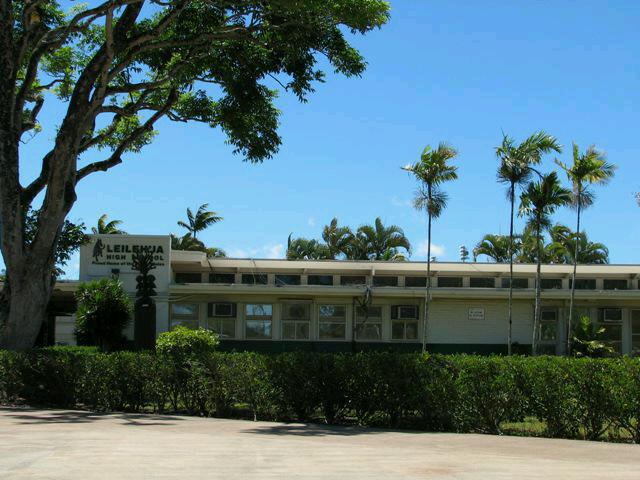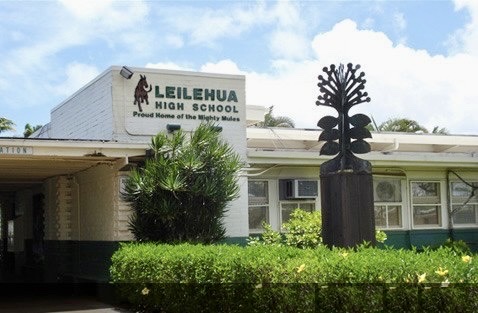Overview
YMCA of Honolulu - Leilehua High School is a substance abuse treatment center for people seeking treatment near Honolulu County. As part of their treatment modalities for recovery, YMCA of Honolulu - Leilehua High School provides telemedicine/telehealth therapy, substance use disorder counseling, and trauma-related counseling during treatment. YMCA of Honolulu - Leilehua High School is located in Wahiawa, Hawaii, accepting no payment accepted for treatment.
YMCA of Honolulu - Leilehua High School at a Glance
Payment Options
- No payment accepted
- Federal, or any government funding for substance use treatment programs
- Payment assistance (check with facility for details)
Assessments
- Screening for tobacco use
- Comprehensive substance use assessment
- Interim services for clients
- Outreach to persons in the community
- Screening for mental disorders
Age Groups
- Adolescents
- Children/adolescents
- Young adults
- Adults
- Seniors
Ancillary Services
- Case management service
- Child care for client's children
- Domestic violence services, including family or partner
- Social skills development
- Transportation assistance
Accreditations
SAMHSA certification for opioid treatment program (OTP):
SAMHSA's Opioid Treatment Programs (OTP) accreditation is a prestigious recognition that signifies a program's compliance with stringent standards and guidelines established by the Substance Abuse and Mental Health Services Administration (SAMHSA). This accreditation demonstrates an OTP's commitment to providing high-quality, evidence-based care for individuals struggling with opioid use disorder (OUD). It serves as a trusted symbol of accountability and excellence, assuring patients, families, and communities that the OTP offers safe, effective, and comprehensive treatment options for OUD.
State department of health:

State Licenses, issued by government agencies, authorize rehabilitation organizations to legally operate within designated geographical areas. The specific licenses required for operation are typically determined by both the nature of the rehabilitation program provided by the facility and its physical location.
Treatment At YMCA of Honolulu - Leilehua High School

Conditions Treated
Alcoholism:
Alcohol addiction is a condition where a person's brain gets used to having alcohol, making it hard for them to control their drinking. This can lead to feeling down, acting without thinking, wanting alcohol strongly, and feeling sick if they don't drink. To help with this, treatment programs are available. These usually include a guided process to safely stop drinking, talking with professionals to work through problems, and joining support groups with others facing similar issues. While these treatments can't fully cure the addiction, they provide tools and support to help individuals live a better life and keep their drinking under control.
Substance use treatment:
Substance abuse treatment programs can help to address addiction and, if relevant, any co-occurring mental health conditions. Programs include outpatient, inpatient, dual-diagnosis, and partial hospitalization. The addict will receive therapies like cognitive behavioral therapy, or dialectical behavioral therapy, and sometimes complementary therapies like acupuncture and mindfulness-based therapy. By attending skills training and recovery groups you’ll build a strong foundation for your recovery and strengthen your support network, increasing your chances of long-term recovery success.

Levels Of Care
Outpatient:
Outpatient treatment in a rehab center offers structured therapeutic services for individuals seeking recovery without full-time residential admission. Unlike intensive outpatient programs, which demand more frequent and longer sessions, standard outpatient care provides a more flexible approach, allowing participants to maintain daily activities and responsibilities while undergoing treatment.
Intensive outpatient treatment:
Intensive Outpatient (IOP) is a specialized level of care aimed at assisting those on their recovery journey from addictions or mental health disorders. Unlike the inpatient or residential treatments where attendees reside within the facility, IOP offers a robust therapeutic experience while enabling participants to stay home and continue their daily routines. Generally, individuals in IOP engage in several sessions weekly, clocking in at around 9-20 hours or even more. These sessions encompass individual counseling, group sessions, familial guidance, and instructional classes that equip attendees with the tools and methods to manage symptoms and avert relapses.
Regular outpatient treatment:
Regular Outpatient Treatment is a flexible and accessible option for individuals seeking recovery from addiction or substance abuse. This program typically involves attending therapy and counseling sessions on a part-time basis, often ranging from one to three sessions per week. These sessions are designed to provide essential support, guidance, and tools for individuals to overcome addiction, manage cravings, and work towards a healthier, sober lifestyle. Regular Outpatient Treatment offers the advantage of maintaining daily routines and responsibilities while receiving the necessary therapeutic interventions to foster lasting recovery.
Aftercare:
Aftercare refers to the structured support and programs offered to individuals after completing an initial treatment phase for substance abuse or other disorders. Recognizing that recovery is an ongoing process, aftercare provides continued counseling, skill-building, group therapy, and resources to help individuals maintain sobriety, manage triggers, and reintegrate into daily life, reducing the risk of relapse and ensuring long-term success in recovery.

Treatment Modalities
Telemedicine/telehealth therapy:
Telehealth Therapy enables individuals to access mental health services remotely through digital technology. Utilizing secure video conferencing, individuals can engage with qualified therapists from the comfort of their home, overcoming geographical barriers and often reducing waiting times. This level of care offers a flexible and accessible approach to mental health support, especially beneficial for those with mobility issues, busy schedules, or residing in rural or underserved areas.
Substance use disorder counseling:
Substance use disorder counseling treatment modalities refer to various approaches and methods used in the counseling and treatment of individuals with substance use problems. This can include individual therapy, group therapy, cognitive behavioral therapy, motivational interviewing, family therapy, and 12-step programs. The goal is to help the individual overcome their substance use, develop healthy coping skills, and lead a fulfilling life in recovery.
Trauma-related counseling:
Trauma-related counseling addresses the deeply rooted psychological wounds and distress that often coexist with substance use disorders. Recognizing that past traumatic experiences can play a significant role in the onset and persistence of addiction, this therapeutic approach aims to help individuals understand and process their trauma, develop coping skills, and work towards healing. Individuals are better equipped to achieve long-term recovery and improved mental well-being by simultaneously addressing both trauma and addiction.
Smoking/vaping/tobacco cessation counseling:
Tobacco Cessation Counseling is a specialized form of guidance and support aimed at helping individuals quit tobacco use. Through a combination of motivational strategies, behavioral techniques, and education on the health risks associated with tobacco, trained counselors assist users in understanding their addiction, developing a personalized quit plan, and navigating the challenges of withdrawal and relapse prevention. This counseling approach can significantly increase the likelihood of successfully quitting and maintaining a tobacco-free lifestyle.
Group counseling:
Group Counseling is a therapeutic approach where individuals come together under the guidance of a trained counselor to share experiences, offer support, and gain insights. This collective format promotes mutual understanding and growth, allowing participants to learn from one another's perspectives and challenges.
Family counseling:
Studies consistently show that the likelihood of sustainable recovery increases when family members are involved in rehab and substance abuse treatment. Genetic elements might influence susceptibility to drug and alcohol dependence and mental health challenges. Family interactions frequently contribute to addiction triggers. However, with the right education, family members can become pivotal support pillars during rehabilitation.
Intervention Services:
"Intervention" refers to a deliberate action or set of actions taken to directly address and alter a specific situation or behavior. Often used in contexts like medicine, psychology, and social work, interventions are designed to prompt positive change, whether it's to prevent harm, improve health, or enhance the quality of life. They can range from medical procedures to address health issues, to structured meetings aimed at helping individuals combat addiction or destructive behaviors.
Motivational interviewing:
Motivational Interviewing (MI) is a client-centered therapeutic approach that fosters behavioral change by assisting individuals in exploring and resolving ambivalence. Specifically tailored for addiction treatment, MI helps clients unearth their own motivations to quit substance use and empowers them to take the lead in their recovery journey. Therapists guide clients toward their goals and self-determined pathways to sobriety through empathetic conversation and skillful questioning.
Anger management:
Anger Management is a therapeutic approach aimed at helping individuals recognize the triggers and signs of their anger and teaching them effective ways to calm down and deal with the situations in a positive manner. Through a blend of counseling, cognitive-behavioral therapy, and practical skill development, individuals learn to reduce aggressive responses, improve communication, and enhance interpersonal relationships, contributing to a better quality of life.
Relapse prevention:
The Relapse Prevention Model is a cognitive-behavioral approach aimed at minimizing or preventing relapses in individuals recovering from addictive behaviors. It incorporates strategies for recognizing and managing high-risk situations and triggers, enhancing self-efficacy, and developing coping skills. Through education, awareness, and self-monitoring, individuals are empowered to maintain their progress and avoid reverting to unhealthy behaviors. This model is essential in promoting long-term recovery and supporting individuals on their journey towards a substance-free life.
Individual psychotherapy:
Individual Psychotherapy provides a private, one-on-one setting where clients can explore and address their personal challenges, behaviors, and feelings related to addiction and recovery. With the guidance of a trained therapist, clients work to uncover the root causes of their substance use, develop coping strategies, and build a foundation for long-term recovery and personal growth.
Ancillary Services
Languages
- Sign language services for the deaf and hard of hearing
Special Programs
- Clients who have experienced trauma
Contact Information
DISCLAIMER: The facility name, logo and brand are the property and registered trademarks of YMCA of Honolulu - Leilehua High School, and are being used for identification and informational purposes only. Use of these names, logos and brands shall not imply endorsement. BetterAddictionCare.com is not affiliated with or sponsored by YMCA of Honolulu - Leilehua High School.



